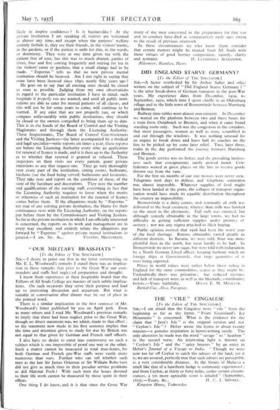DID ENGLAND STARVE GERMANY?
[To the Editor of THE SPECTATOR.]
Sta,—A factor overlooked by Sir Arthur Salter and other writers on the subject of "Did England Starve Germany ? " is the utter break-down of German transport in the post-War years. My experience dates from December, 1919, to September, 1920, which time I spent chiefly in an Oldenburg village and in the little town of Bremervorde between Hamburg and Bremen.
Railway time-tables were almost non-existent. In December we waited on the platform .between two and three hours for a train from Osnabriick to Bremen, and when it came found standing room only. Such was the congestion in the corridors, that most passengers, women as well as men, scrambled in and out through the windows. It was nothing unusual for an engine to break down and leave half its coaches on the line to be picked up by some later relief. Two, later three, trains in the day performed the journey between Hamburg and Bremen.
The goods service was no better, and the prevailing lawless- ness such that consignments rarely arrived intact. Con- federates waited at given places on the line to receive goods thrown out from the vans.
For the first six months of our stay motors were never seen. Telegrams took days to deliver, and telephone connexion was almost impossible. Whatever supplies of food might have been landed at the ports, the collapse of transport organ- isation would have made its equable distribution throughout the country an impossibility.
Bremervorde is a dairy centre, and nominally all milk was delivered to the local creamery, whence skim milk was hawked on the street in the afternoons. Full milk was rationed, but although scarcely obtainable in the large towns, we had no difficulty in getting sufficient supplies under promise of secrecy ; nor was any stigma attached to illicit buying.
Public opinion averred that 1916 had been the worst year of,,!-he food shortage. Rations obtainable varied greatly in different districts. In Bavaria, we were told, flour was more plentiful than in the north, but meat hardly to be had. In Bremervorde we never saw sugar, but were told with indignation by a North German Lloyd officer,. keeping harbour watch on foreign ships at Geestemiinde, that large quantities of it were being exported.
Prices in world values were rather below those ruling in England for the same commodities, scarce as they might be. Undoubtedly there was privation ; but reduced incomes and lack of transport were, as well as the blockade, contributing
factors.—Yours faithfully, HELEN E. M. MEOLLER. Bernal-Cue, Altos, Paraguay.














































 Previous page
Previous page